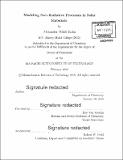Modeling non-radiative processes in solar materials
Author(s)
Kohn, Alexander Wolfe
DownloadFull printable version (8.997Mb)
Other Contributors
Massachusetts Institute of Technology. Department of Chemistry.
Advisor
Troy Van Voorhis.
Terms of use
Metadata
Show full item recordAbstract
In this thesis, we investigate methods and systems for understanding the electronic properties of a variety of systems relevant to organic photovoltaics. The second chapter examines how to predict the radiative and non-radiative decay rates of a large family of naphthalene derivatives. Naphthalene is a common building block in many organic electronic devices and possesses complex photophysics that are difficult to capture. Principally using time-dependent density functional theory, we are able to reproduce the experimental rates and, moreover, the fluorescence quantum yield, quite accurately. The next chapter then goes into extensions of the methodology discussed and analyzed in the prior chapter. Anthracene derivatives used for transferring triplet energy between a quantum dot and rubrene phase are found to have varying impacts on the total transfer efficiency based on the triplet lifetime of the anthracene derivative. Most potently, significant spin-orbit coupling in some of the derivatives causes substantial deactivation. An additional family, BODIPY dyes, is also investigated. They are found to undergo internal conversion gated by an excited-state conformational change, suggesting this may be a common motif. The fourth and fifth chapters investigate different interfacial effects and their impacts on the energy levels of electrons and holes in disordered organic devices. They look at specific systems: the interface between three different donors, PPV, P3HT, PTB7, and PCBM. They find that the interface can both reduce and induce disorder in different systems and that full treatment of the electronic environment is important for capturing accurate results. The final chapter investigates the use of neural networks to predict optimal range-separation parameters for density functionals.
Description
Thesis: Ph. D., Massachusetts Institute of Technology, Department of Chemistry, 2018. Cataloged from PDF version of thesis. Includes bibliographical references (pages 89-102).
Date issued
2018Department
Massachusetts Institute of Technology. Department of ChemistryPublisher
Massachusetts Institute of Technology
Keywords
Chemistry.